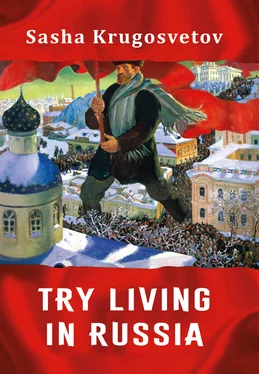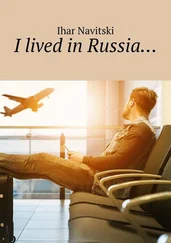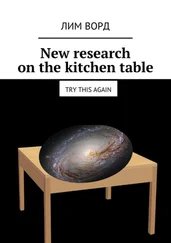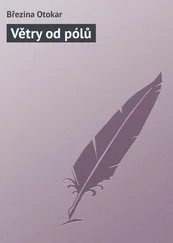Sasha Krugosvetov - Try living in Russia
Здесь есть возможность читать онлайн «Sasha Krugosvetov - Try living in Russia» — ознакомительный отрывок электронной книги совершенно бесплатно, а после прочтения отрывка купить полную версию. В некоторых случаях можно слушать аудио, скачать через торрент в формате fb2 и присутствует краткое содержание. Город: Moscow, Год выпуска: 2020, ISBN: 2020, Жанр: russian_contemporary, на английском языке. Описание произведения, (предисловие) а так же отзывы посетителей доступны на портале библиотеки ЛибКат.
- Название:Try living in Russia
- Автор:
- Жанр:
- Год:2020
- Город:Moscow
- ISBN:978-5-00153-035-0
- Рейтинг книги:3 / 5. Голосов: 1
-
Избранное:Добавить в избранное
- Отзывы:
-
Ваша оценка:
- 60
- 1
- 2
- 3
- 4
- 5
Try living in Russia: краткое содержание, описание и аннотация
Предлагаем к чтению аннотацию, описание, краткое содержание или предисловие (зависит от того, что написал сам автор книги «Try living in Russia»). Если вы не нашли необходимую информацию о книге — напишите в комментариях, мы постараемся отыскать её.
Try living in Russia — читать онлайн ознакомительный отрывок
Ниже представлен текст книги, разбитый по страницам. Система сохранения места последней прочитанной страницы, позволяет с удобством читать онлайн бесплатно книгу «Try living in Russia», без необходимости каждый раз заново искать на чём Вы остановились. Поставьте закладку, и сможете в любой момент перейти на страницу, на которой закончили чтение.
Интервал:
Закладка:
Dusya was working at a factory for packing materials. Sometimes as a packer. Sometimes as a stock keeper. She received food rations for herself and the two girls. The first year of the blockade was very hard. During the second year her enterprise set up a farming co-operative. They were allocated a plot of land in Kuzmolovo and went there in the summer to farm. Dusya, who came from the countryside and had worked in agriculture before, was appointed head of the co-operative. They grew vegetables, herbs, pumpkins, marrows, sunflowers, and turnips. In their free time they would go into the woods and collect mushrooms and berries. They put away stock for the winter. Her girls Dusya had sent to children's summer camps, Tamara to Ozerki and Vera to Koltushi. For weeding the fields during June and July. What kind of weeding I don't know. But the children lived fairly well in the camps. Some food always came their way. Moreover, their mother would come and bring them food from the vegetable patch or from the woods. During the winter the girls went to school. At school they received food on ration cards, breakfast and lunch. The city was making an effort to look after the children. Lunch was two courses, sometimes there was even stewed fruit. But what kind of food were they given? Skilly.
During the winter life was very hard. Inside the houses the temperatures were below freezing. The heating was destroyed, everything was covered in blocks of ice. People were using small wood-fired stoves for heating. The storeroom at the factory where Dusya worked was warm. There were packing materials, so there was always something for firing the stove. That's where the family went to warm themselves up. Often they would stay there for the night. There wasn't enough food. The fear that there would not be enough food remained with the girls for life. As did the habit to buy too much, to stuff their children and grandchildren with food. The girls became emaciated. Dusya gave blood to receive additional food. But many didn't survive. It was mostly men who died, as they needed more food. In the family next door the father and a 14-year old boy died from hunger. The girls saw that nobody removed the dead bodies for a long time. Their relatives kept the deceased in the house until the end of the month to retain their ration cards and receive their food. Then they took the bodies of their loved ones on a sledge somewhere near the empty People's House in the Lenin Park. From there the city services would take them to different cemeteries.
This is how the sisters lived. School during winter, camp during summer. When the war was over they entered technical college. Tamara studied to become a cinema technician. Fidgety as she was, she wanted to be close to the film world. She was soon thrown out, as at college one needs to think and Tamara wasn't too good at that. Vera joined food college. Closer to sustenance, so to say. They lived comfortably, one might say. But all three of them were capable of yelling. Tamara and her mother would gang up against the younger sister, or Vera and Dusya would rally against Tamara. All three were sharp-tongued and slightly rude. Dusya received a large number of awards and recognitions. This didn't save her from trouble. In 1947 she started working in a bakery. The spiteful manager with the crooked teeth gave food to her young lover. And three bakery assistants were found with a deficit. In Dusya's case an entire 600 grams were missing. Prison, then got parole. But she was inside for ten months. She doesn't like talking about this now, and not about the blockade either. That's completely understandable: these memories are very painful.
My Nanny
Post-war life was coming together. My father got a comfortable job. He was still fairly influential then. My mother had a secondary technical education. She was working in the Hypronickel Institute and designing beneficiating equipment for Norilsk Nickel. At that time the Institute was situated in the house of Vasilii Engelgardt, adjacent to the Small Hall of the Philharmonic Society. My mother loved walking to work. What a wonderful route she had, from Liteiny Prospekt past the Circus and the Mikhailov Castle, along Nevsky Prospekt to the baroque Engelgardt House.
It was the first summer after the War. We all lived together at the dacha, my father, my mother and I. Of course the dacha was rented. A small wooden house at the shore of the Razliv with a small wooden jetty. In the morning I would ran outside to greet my father. He was fishing already, using a rod and a worm. Next to him a bucket of water full of perches and breams. In the evening my father, together with my uncles and some local men, would pull a drag net across the lake. A wonderful catch. After the war the Razliv was full of fish. My parents bought eels from the fishermen. The big slippery fish escaped from the basin and crawled across the entire allotment. These were my first impressions of a happy childhood.
Of course, not everything was easy. Something was going wrong at my mother's job. Sometimes she would cry because the management was so strict. They started taking me to kindergarten. The kindergarten was situated in a very beautiful building with a wonderful landscaped courtyard off Liteiny Prospekt. My mother used to bring the unattractive nursery teacher makhorka, rough tobacco. When the makhorka was late I would get punished. Evidently the relationship with the teacher wasn't too good. One «misdeed» I remember well. We children were playing hide-and-seek. And I «hid» under the short skirt of a girl. I couldn't understand why the teacher got so angry. I had to stand in the corner for the whole day; I wasn't even allowed to go to the toilet. I wet myself. And in the evening my mother, who came to pick me up on the way home from work, somehow managed to sort it all out. I can't remember that she told me off for the «story with the skirt». But anyway, how could all this have been even remotely serious in comparison with the war that was behind and the 1950s that were drawing near?
My parents were earning comfortably. They decided to hire a household help to do the shopping and cooking and to look after me. That was common at the time. The paradoxes of those days. A family with a child and a household help in one room. In a communal flat. In summer, when I was still very little, I climbed onto the wide sill of the window that opened onto Liteiny Prospekt. And I looked down from the third floor onto the street. Our household help, a jolly, fat girl from the countryside, held me tightly and said: «Alexander Yakovlevich, come down from the window, please. If you fall, your mummy will be angry.»
Later there was another busty girl past her prime. Lyuda, Lyudmila. Before she came to us she used to work for Shapiro, the cinema director. She lived at his place at the corner of Nevsky and Vladimirsky Prospekt. My father remembered that he met the future director of LenFilm when he himself was involved in amateur theatre. The girl would tell us with great abandon about the actors who came to see the director. She especially liked Vitsin, «he's just so funny, no matter what he says, everybody is rolling about laughing». She was very observant, our simpleton girl. Vitsin became famous a lot later, when the film «Barbos the Dog and the Unusual Race» came out. In the end, our Lyuda was after one thing only: to finally find a husband. She evidently disliked the boy she was supposed to look after, i. e. me. No matter what I did, everything irritated her – my escapades, my clumsiness, typical of a child used to being indoors. And the work in our house was not to her liking either. She stayed for a short time only, like the others before her. My mother had the rare ability to maintain good relationships with all of them. I heard that she managed to stay in touch with Lyuda, too, until the latter left for the virgin soil of Kazakhstan a few years later. Probably in the hope to sort out her private life. What happened next isn't very clear. At first something worked out, then it all went bad somehow. Upon returning from the virgin soil she came to see us once on Liteiny Prospekt.
Читать дальшеИнтервал:
Закладка:
Похожие книги на «Try living in Russia»
Представляем Вашему вниманию похожие книги на «Try living in Russia» списком для выбора. Мы отобрали схожую по названию и смыслу литературу в надежде предоставить читателям больше вариантов отыскать новые, интересные, ещё непрочитанные произведения.
Обсуждение, отзывы о книге «Try living in Russia» и просто собственные мнения читателей. Оставьте ваши комментарии, напишите, что Вы думаете о произведении, его смысле или главных героях. Укажите что конкретно понравилось, а что нет, и почему Вы так считаете.












